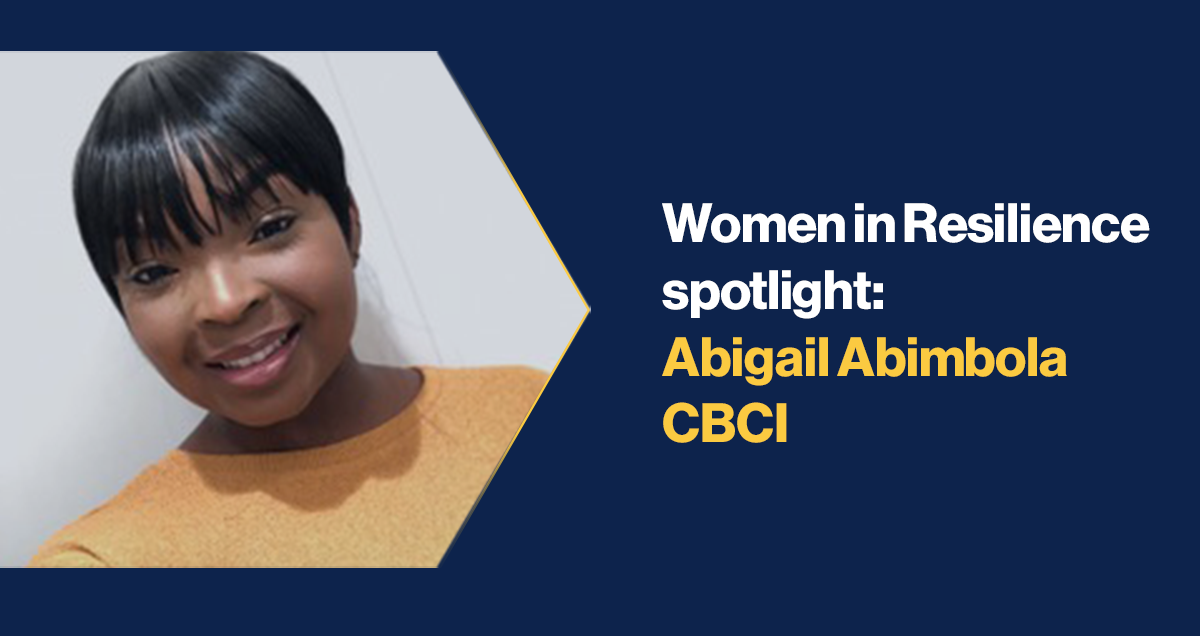Women in Resilience (WiR) Spotlight: Abigail Abimbola CBCI

Abigail has been in the industry for just over three years. She began her career as an Intern, moving onto a Junior Analyst and is now an Analyst for a large international company. She has had the opportunity to work on a number of different projects involving implementing BC Programmes in its early stages, mapping Customer Journeys and building resilience around each of the stages, as well as assisting with Global Crisis Management Exercises.
She has obtained the CBCI certification, passing the exam with merit and is currently self-studying the Foundations of Financial Risk with GARP. She enjoys studying, learning new skills and undertaking any and every challenge.
She is navigating the world as a new mum in the middle of the pandemic and taking each day as it comes.
What brought you into the industry?
In 2017, fresh out of university, I was working as a customer service representative. During the induction process, the Business Continuity Manager (my first boss in Business Continuity – fantastic man!) was conducting the introduction for the BC processes and how to use the emergency communication tool. That was what first caught my interest. A few weeks later, I saw him in the office kitchen and he told me how he was looking for an intern. I expressed my interest and, after doing some research into the industry, I found it even more interesting and exciting and thought, “Yes, this is what I would like to do!”. We had an informal chat / interview and I was provided the opportunity to begin my career as a Business Continuity Intern.
I’m very glad I took that bold step!
How did you reach your current position? What challenges did you face?
I was a Business Continuity Intern for six months, then I moved onto a Junior Business Continuity and Risk Analyst position, which involved a wider scope of work involving strategic risk. An opportunity arose to join a larger, multinational company as a Business Continuity Analyst, where the Business Continuity programme was still in its early stages. I decided it was the right time for me to move on, take up a new challenge and assist in the implementation of the Business Continuity programme.
I believe the biggest challenge I faced with that move was the sheer size of the company – it was a lot larger than my previous place of work. I went from knowing all of my business continuity coordinators and seeing them in the office on a regular basis, to having only one coordinator for my entire office and everyone else working remotely. That was quite a challenge to adapt to, however, it encouraged me to do my best to ensure that I remained in constant communication with the stakeholders to keep Business Continuity at the forefront and embedded into the organization’s culture.
I did also have to readjust the way I was used to implementing Business Continuity, again due to the size and nature of the company – but I am grateful for this opportunity because it allowed me to see how business continuity can be achieved in another way which is still very effective.
Another challenge was moving from a FinTech company, where BC implementation needed to be in accordance with regulations for the financial industry, to a Marketing company.
Which specific skills do you think are needed to become a leader in your field?
I believe there are a number of skills that are needed to become an effective leader across any field. However, in the BC world, there are a few that a leader must have:
Personable – You must be a likeable and an approachable individual, because a lot of your work relies on other people. In order to complete your BIA and BCPs etc you need the help of others, so it is very important that you can maintain stakeholder engagement.
Determined – Getting people on board and embedding business continuity into a company that has never had to do that level of work before can be difficult, so you must stay on top of your work and remain focused and not get discouraged.
Straightforward – Letting people know how much work goes into the programme from the onset and being transparent about where you are in the programme.
Have a ‘thirst’ for knowledge – A leader in this field must understand not only how the company works, but also the industry. I believe this is vital and will allow them to ask the right questions and provide the correct insight into recovery strategies. Additionally, this allows you to be passionate about why the company needs BC/Resilience arrangements in place.
Do you think that the BCI WiR initiative will influence our industry? If yes, how?
Yes, it has allowed young women, like myself, to see what can come out of the industry career-wise. Having the platform, the webinars and the events allows me to see the vastness of the BC world: all the different approaches to BC, the various industries and career paths. Moreover, it motivates people as well, not only to move forward in their careers, but inspires them to do more, get involved and take part. In terms of influencing the industry as a whole, I believe it will because what the women gain from the platform, they can implement in their individual companies.
What changes would you like to see in the profession?
An openness to incorporate all areas of resilience into organisations: spanning across business continuity, physical security, crisis management, third party assurance and disaster recovery. Now more than ever, It is very crucial that we have the ability to cover all areas of resilience and provide an insight, even if it means there is one person in the team each covering one area, whilst also providing the opportunity to explore all areas of resilience. Ultimately, I believe we need a more concrete understanding of what it means to have Operational Resilience and then we can move forward and embed it into our organisations in the best way possible.
In your opinion, why should more people be joining the resilience community?
Because it’s relevant! It is a very diverse community as it is, but I believe that if there were more people from different walks of life e.g. Law, Finance, Pharmacy and the likes, it would allow entirely new insight into how we can provide assistance to companies when establishing their BC/Resilience strategies. It would also cater to those departments in companies because they would speak the same language and coordinators may be more receptive to it.

